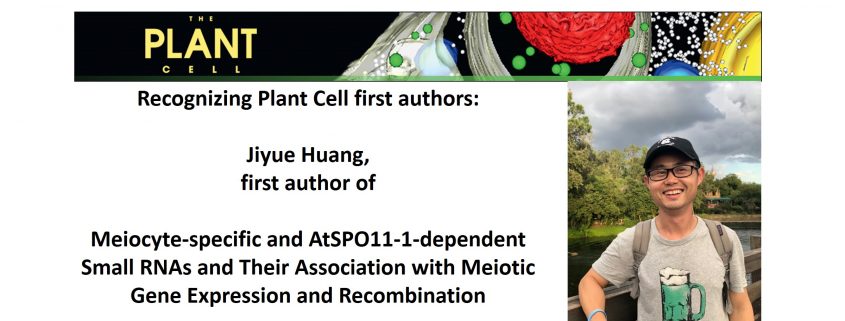Recognizing Plant Cell first authors: Jiyue Huang
Jiyue Huang, first author of Meiocyte-specific and AtSPO11-1-dependent Small RNAs and Their Association with Meiotic Gene Expression and Recombination
Current Position: Postdoctoral Research Fellow at Copenhaver Lab, University of North Carolina-Chapel Hill, NC
Education: PhD in Biochemistry and Molecular Biology, Department of Biochemistry. Fudan University, China; M.S. in Genetics, Department of Genetics. Fudan University, China; B.S. in Agriculture, Department of Agronomy in Seed Science and Engineering. China Agricultural University, China.
Non-scientific Interests: Running, travelling, swimming, skiing, looking for fun things to do with my daughter
Brief bio: I have a long-term interest on understanding the molecular mechanisms of meiosis and meiotic recombination in higher eukaryotes. As a PhD student supervised by Dr. Hong Ma and Dr. Yingxiang Wang since 2011 at Fudan University, I have been working on the meiotic recombination associated DNA synthesis including the Replication Factor C1, DNA polymerases alpha, epsilon and delta. We refined the meiotic recombination model by revealing that both leading and lagging strand syntheses are required for double strand break repair. After I moved to Greg Copenhaver’s lab at UNC as a postdoc in 2016. I have been working on establishing a pollen-based visual assay system to measure meiotic recombination in tomato, and other projects including characterizing AtDMC1 suppressors, genetic suppressor screening for novel factor(s) that influence DNA synthesis in meiotic recombination, and exploring the meiocyte small RNAs and their association with meiotic recombination. This piece of work revealed a group of meiocyte-specific sRNAs that are mainly dependent on AtSPO11-1, significantly enriched in genic regions and exhibiting positive correlation with meiocyte-preferential gene expression unrelated to DNA methylation. We also found that AtSPO11-1-dependent sRNAs tend to be associated with meiotic recombination hotspot motifs. These results reveal different meiotic and mitotic small RNA landscapes and provide new insights into how sRNAs relate to gene expression in meiocytes and meiotic recombination.
姓名:黄霁月
现任职务:北卡罗来纳大学教堂山分校Copenhaver实验室博士后
教育背景:生物化学与分子生物学博士,生物化学系,复旦大学;遗传学硕士,遗传系,复旦大学;农学学士,种子科学和工程农学系,中国农业大学。
兴趣爱好:跑步,旅游,游泳,滑雪,和孩子一起做有趣的事情
自我介绍:本人长期致力于研究高等真核生物减数分裂和重组的分子机制。博士阶段,本人在复旦大学马红、王应祥教授的指导下,系统研究了DNA合成相关组分:复制因子C1、DNA聚合酶α、δ和ε在减数分裂重组中的功能,揭示了前导链和后导链在双链断裂修复中的作用,完善了减数分裂重组模型。2016年9月始,本人加入北卡罗来纳大学教堂山分校Copenhaver实验室开始博士后工作。开展的工作包括:1.在番茄中建立基于四分体花粉的减数分裂重组测量系统;2.AtDMC1抑制子的鉴定;3.减数分裂重组中DNA合成相关基因抑制子的遗传筛选;4.减数分裂细胞中小RNA的特征分析及其与减数分裂重组的关联。近期在The Plant Cell期刊上发表的:“Meiocyte-specific and AtSPO11-1-dependent small RNAs and their association with meiotic gene expression and recombination” 一文即为减数分裂细胞中小RNA分析课题的总结。通过改工作,我们揭示了拟南芥雄性减数分裂细胞中AtSPO11-1依赖的、减数分裂细胞特异表达的小RNA倾向于在基因区域富集;与DNA甲基化不相关;却和减数分裂优先表达基因正相关。我们还发现AtSPO11-1依赖的小RNA位点能够富集已知的减数分裂重组热点关联的DNA基序。这些结果表明了减数分裂细胞中小RNA的独特性,提供了小RNA参与基因表达和重组调控的新见解。




